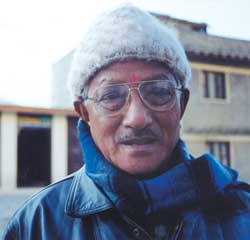 It the age of six, his parents left their home village in Gorkha and took Bhakta Bahadur Rana with them to Burma. That was a time when thousands of Nepalis from the midhills left their impoverished villages and headed east in search of work-to Darjeeling, Assam and further to Burma and Thailand. Bhakta Bahadur's parents were in the Thai town of Surat Thani when the war erupted. The Japanese were in Burma, and at age 16 Bhakta Bahadur left his parents and went to work in a rubber plantation in Malaya.
It the age of six, his parents left their home village in Gorkha and took Bhakta Bahadur Rana with them to Burma. That was a time when thousands of Nepalis from the midhills left their impoverished villages and headed east in search of work-to Darjeeling, Assam and further to Burma and Thailand. Bhakta Bahadur's parents were in the Thai town of Surat Thani when the war erupted. The Japanese were in Burma, and at age 16 Bhakta Bahadur left his parents and went to work in a rubber plantation in Malaya. But in 1942 the war pursued him there. When it was all over, south-east Asia lay in ruins, the Japanese were gone but anti-colonial civil wars continued. In the jungles of the Malayan peninsula, Maoist guerrillas were battling the British, and Bhakta Bahadur joined up with the colonial police as a staff sergeant.
"Fifty years ago I fought Maoists in Malaya, now I see Maoists in my own country. Sometimes life is very ironic," rued Bhakta Bahadur during a Dasain trip to Nepal to make pilgrimages to Janakpur, Manakamana and Muktinath. Bhakta Bahadur looks much younger than his 80 years, and despite a fall from a horse in Muktinath after which he was evacuated by helicopter to Jomsom, he looked none the worse for it.
Today, Bhakta Bahadur and his son run a successful security agency. "I hire only Nepalis, they are my blood, you have to help people of your own blood." Bhakta Bahadur has given employment to more than 300 Nepalis in Malaysia many of them body guards for VIPs and business executives.
Bhakta Bahadur is the patriarch of the Nepali community in Malaysia, and often takes up the problems of the estimated 5,000 Malaysians of Nepali origin directly with Prime Minister Mahathir Mohammad. The latest case involved the predominantly-Nepali town of Rawang which was directly in the path of a new highway, the inhabitants were relocated and their housing needs taken care of.
Bhakta Bahadur says he has deep attachment to his Nepali roots and is worried about how younger Malaysian Nepalis are losing touch. That is why he gets the community to celebrate Dasain, speak Nepali and keep their Nepali identity. His only regret in life: "I never really had the time to study. Today the youngsters are all well-educated and it has opened their eyes."
Even without education, Bhakta Bahadur has the wisdom and vision to lead his community. Common sense and generosity, it seems, do not need education. "I have become religious in my old age," he admitted to us. "I have understood the value of my homeland, my soil, my water. I will come back and die here."


